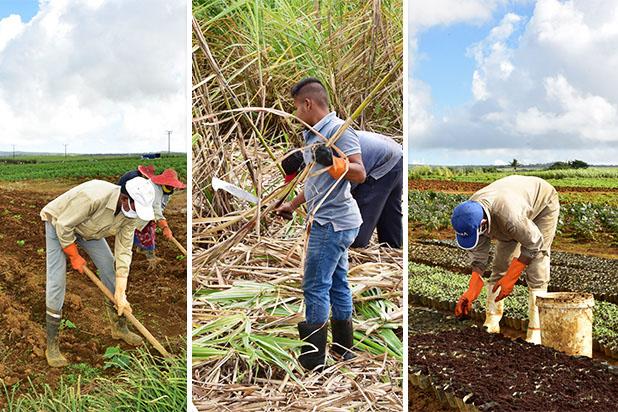Africa-Press – Mauritius. The Minister of Finance, Economic Planning and Development, Dr Renganaden Padayachy, announced, this evening, a series of measures for the local Agro-Industry sector. These measures concern fruits and vegetables, the tea sector, apiculture, sugar sector, and livestock.
Minister Padayachy highlighted that Mauritius relies on imports for more than 75 percent of its food requirements, a market worth Rs 37 billion and representing eight percent of the Gross Domestic Product. He added that higher levels of self-sufficiency not only mean greater food security, but also more investment, more jobs and higher growth.
Dr Padayachy announced the following measures in a bid to incite fruits and vegetables planters to boost local production: a grant of 50 percent, up to a maximum of Rs 500,000, for the purchase of a sheltered farm for hydroponics, as well as for the purchase of a second sheltered farm; increasing the subsidy on Onion, Potato, Garlic and Bean seeds sold by the Agricultural Marketing Board (AMB) from 50 percent to 75 percent; and introducing a Minimum Guaranteed Price, for planters, of Rs 33,000 per ton for onions, Rs 38,000 per ton for potatoes and Rs 50,000 per ton for beans.
He also observed that planters will be encouraged to bring back abandoned land under cultivation through a “Crop Replantation Fund” at the Development Bank of Mauritius (DBM) at an annual preferential rate of 2.5 percent.
He added that the DBM will invest in two food security clusters at a cost of Rs 200 million each, namely: an agro-processing park over an area of 5,000 square metres at Henrietta; and a fruit processing cluster at Rivière du Rempart with units of up to 100 square metres for some 50 Small and Medium Enterprises.
In addition, Dr Padayachy underlined that, in order to further support fruit and flower growers, Budget 2022-2023 provides for: a grant of 50 percent up to a maximum of Rs 500,000, for the setting up of fruit ripening facilities; and a maximum grant of Rs 100,000 for procurement of planting materials.
Tea Sector In a bid to accelerate the re-emergence of the tea sector, the following measures were also announced: Apiculture Dr Padayachy also underlined that we have the potential to reduce our dependency on import of honey, which accounts for 90 percent of our consumption.
As such: a subsidy of Rs 500 per Bee queen will be provided to beekeepers up to a maximum of 10 queens; a one-off grant of Rs 150,000 per beekeeper will be provided to secure the Bee keeping zones; and the AMB will import beeswax in bulk and re-sell to bee keepers at an affordable price.
Furthermore, the scheme for acquisition of CCTV camera will be extended to bee honey producers and new mellifluous plants will be introduced to enable year-round honey production. Sugar Sector
As far as supporting small sugarcane planters and ensuring a fair and equitable distribution of proceeds from sugar cane cultivation is concerned, Government will: maintain the minimum guaranteed price of Rs 25,000 per ton for planters producing up to 60 tons of sugar; continue to pay the premium to the Sugar Insurance Fund Board in respect of those producing less than 60 tons of sugar; and waive CESS in respect of crop 2022.
Moreover, in view of encouraging sugar planters to renew some 10,000 hectares of crops: the grant under the Cane Replantation Scheme will be increased by 43 percent from Rs 35,000 to Rs 50,000 per arpent; and a “Cane Replantation Revolving Fund” will be introduced by the DBM to provide loans at an annual preferential rate of 2.5 percent.
Those who want to bring back abandoned land into cultivation will also be eligible under this Scheme. Livestock Sector With regards to the livestock sector, Minister Padayachy observed that the latter has an important role to play in our food security strategy for meat and dairy production locally.
To this end, he emphasised: the DBM will invest Rs 200 million in five Livestock zones at Henrietta, Salazie, Mare-d’Albert, Petit-Merlot, and Ex-Tea Belt Road; the subsidy on animal feed is being increased to Rs 10 per kilogram; the Cattle Breeding Scheme is being extended to importers of cattle; and a grant of Rs 15,000 will be provided to breeders to purchase calves of less than one year.
Dr Padayachy also informed that: Rs 100,000 will be provided to cooperatives Under the Zero Budget Natural Farming Scheme for the purchase of cows and construction of cow sheds; a 30 percent subsidy will be provided on the purchase of equipment for production of locally produced pasteurised milk; a Goat Farming Scheme for cooperatives for the purchase of goats and construction of sheds up to a maximum of Rs 200,000 will be introduced; and a “Salon de L’Agriculture” will be organised to promote Mauritian agriculture.
He added that for pig breeders, Rs 5 million is provided for the extension of artificial insemination facilities and Rs 15 million has been earmarked for the setting-up of waste treatment facilities at Bassin Requin and St Martin.
Other measures announced for the Agro-Industry sector A series of other measures to support planters in the face of a surge in prices of fertilisers and seeds have also been announced in Budget 2022-2023. They comprise:
Furthermore, in view of financing the Agri-Transformation Programme, the Industrial Finance Corporation of Mauritius Ltd will offer a preferential lease of 2.5 percent to Cooperatives for the purchase of mini-tractors; and leasing facilities of up to Rs 25 million with an annual interest rate of 3.5 percent.
An Integrated Modern Agricultural Morcellement Scheme on a plot of land exceeding two arpents will be introduced to encourage innovative agricultural practices with the following incentives: an eight-year tax holiday on income; and an exemption from payment of Registration Duty.
In addition, developers, under the scheme, will be allowed to convert up to 15 percent of that land for residential or commercial use and be exempted from payment of land conversion tax.
An eight-year income tax holiday will also be granted to planters engaged in sustainable agricultural practices registered with the Economic Development Board.
For More News And Analysis About Mauritius Follow Africa-Press







